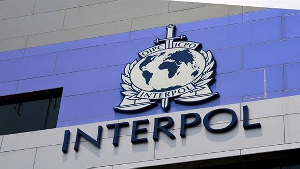Fourteen-year-old Abu Mohammed knows what it is like to go hungry but his extraordinary talent for football means he no longer has to.
His life changed two years ago when he was offered a place at the Ghanaian football academy run by Tom Vernon, the Africa scout for English soccer giants Manchester United. The academy is a private venture by Vernon.
Wowed by Mohammed's skill at trials in his home-town of Sunyani in northern Ghana, the academy offered him a four-year academic scholarship.
Mohammed cried when his poorly educated parents failed to understand what was on offer and said "no". When they finally did agree, he arrived at the academy in the hills outside the capital Accra with one change of clothes in a polythene bag.
"I thought the people will laugh at me," Mohammed remembers. "After three days, they saw I was wearing the same clothes, they bought a new bag and new things for me."
Now when he goes home, his neighbours are surprised at how big he is: the difference made by three meals a day.
"They don't think it is me. I have changed a lot," he says.
Two years ago, Mohammed did not speak English and when he pictures the life that could have been his, failure is not an option: his parents are cassava farmers and rarely have money for his sister to go to school.
"She is at home helping my mother to farm. Sometimes you will not even get the food to eat," he said. "When I stop playing, there is nobody who will support me. I want to make it."
Football crazy
It is too early to say whether the ambition that lights up Mohammed's face, the passion with which he speaks about soccer, or his skills on the pitch will earn him a place at his favourite clubs: Manchester United or English rivals Arsenal.
But his talent has given him opportunities available to few poor children in West Africa.
Four-time winners of the African Nations Cup, Ghanaians are crazy about football. The country's qualification for this year's World Cup finals in Germany has made their passion all the more intense.
For many poor children, football offers an escape from poverty. The first step can be getting a place at one of the handful of academies that offer education as well as soccer training.
Vernon's academy is partly funded by his "gap year" business which offers British school leavers the chance to work in sports in Africa. The hope of discovering stars whose signing fees will bankroll the school is tempered by the realisation that only a handful of the 36 students will make it.
Two graduates are currently in talks with European clubs while others are on academic scholarships in the United States.
"At 18, unless you are (Ghanaian midfielder) Michael Essien, there is no guarantee you will make a career, a lot of players fall by the wayside between 18 and 21," Vernon says.
"At least, it is giving these boys an opportunity to build themselves a better life through talent for football."
But getting the boys to take education seriously in case their dreams fall apart is difficult, he says. In Mohammed's case, they had to ban him from the pitch to make him realise he had to improve his grades.
Superstars
Fourteen-year-old Waris had been playing football in his home town of Tamale in northern Ghana for several years before he came to the academy. He knows how hard it will be to succeed.
"I want to be famous. I want to prove to the world that I have something important in me," he says. "When I was in Tamale, I thought you just had to play. When I came here, I know you have to train and work hard."
Everyone wants to be a superstar, says Karel Brokken, manager of the six-year-old Feyenoord Fetteh football academy, which is financed mainly by the Dutch club of the same name.
"There are no miracles, you can only make footballers become better," he said. "Superstar, that is something else."
The US$1.2 million Feyenoord facility - which boasts a school, gym, artificial pitch and computer room - offers a striking contrast to the facilities elsewhere in Ghana.
Ghana Football Association's General Secretary Kofi Nsiah admits players often have no boots and are trained on bad pitches by poor coaches.
The hefty investment would be justified several times over by the discovery of a superstar such as Liberian former World Player of the Year George Weah or Ghana's legendary midfielder Abedi Pele, who dominated African football in the early 1990s.
The academy has one graduate at Feyenoord and another at a satellite club in Belgium but the boys' backgrounds mean the academy is as much a social project as a serious attempt to generate players for the Dutch club.
"You see a player, he has skill, he is intelligent, you bring him in at 13, it is a long way to 18. Is he serious? Is he disciplined? In the end, there are only 11 players in the first team," Brokken said.
"Many people have no money to send children to school. What we see here is they also hope through football, they can become somebody, why not? For a young boy, a dream is very important."
Soccer News of Wednesday, 8 February 2006
Source: China Daily
















